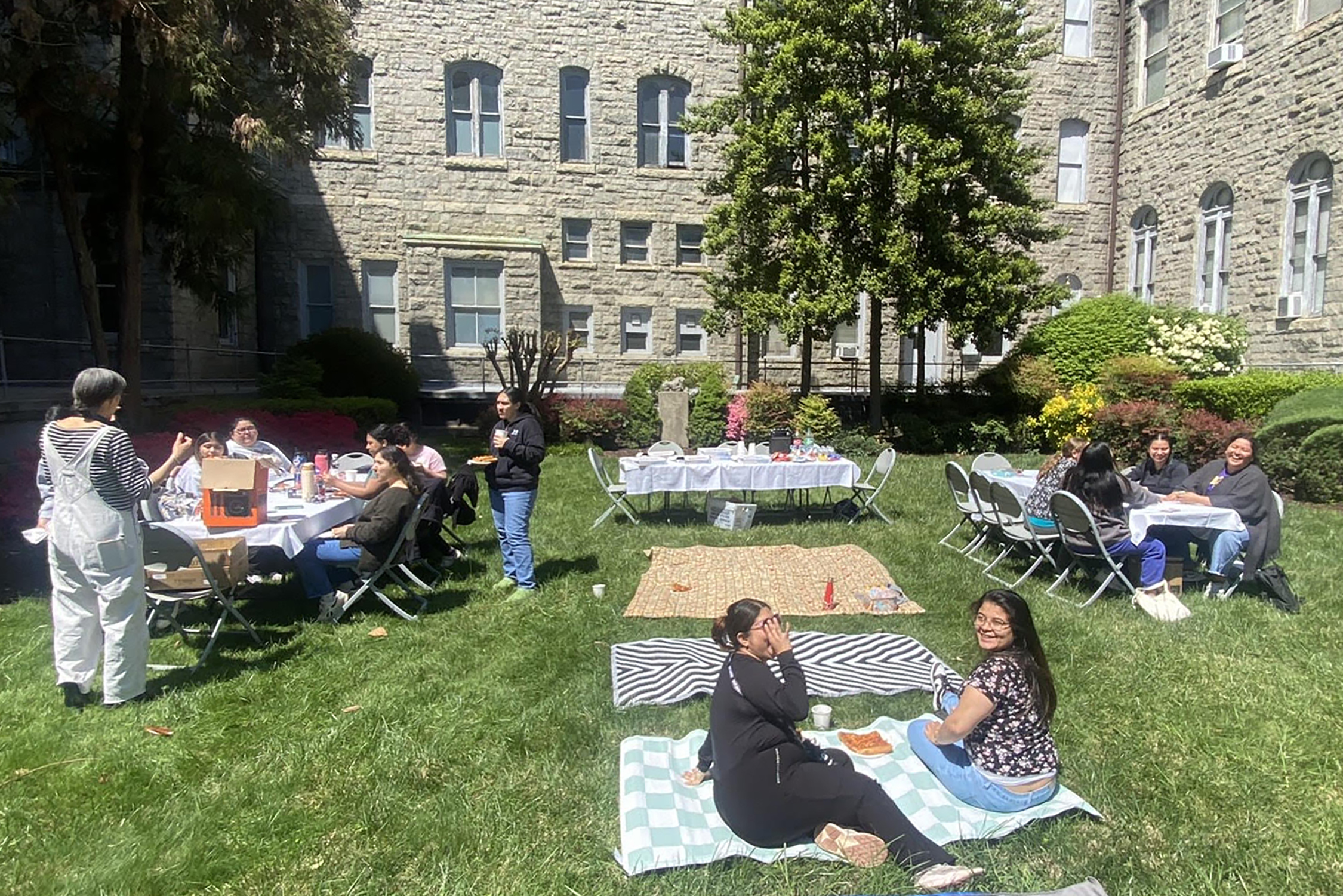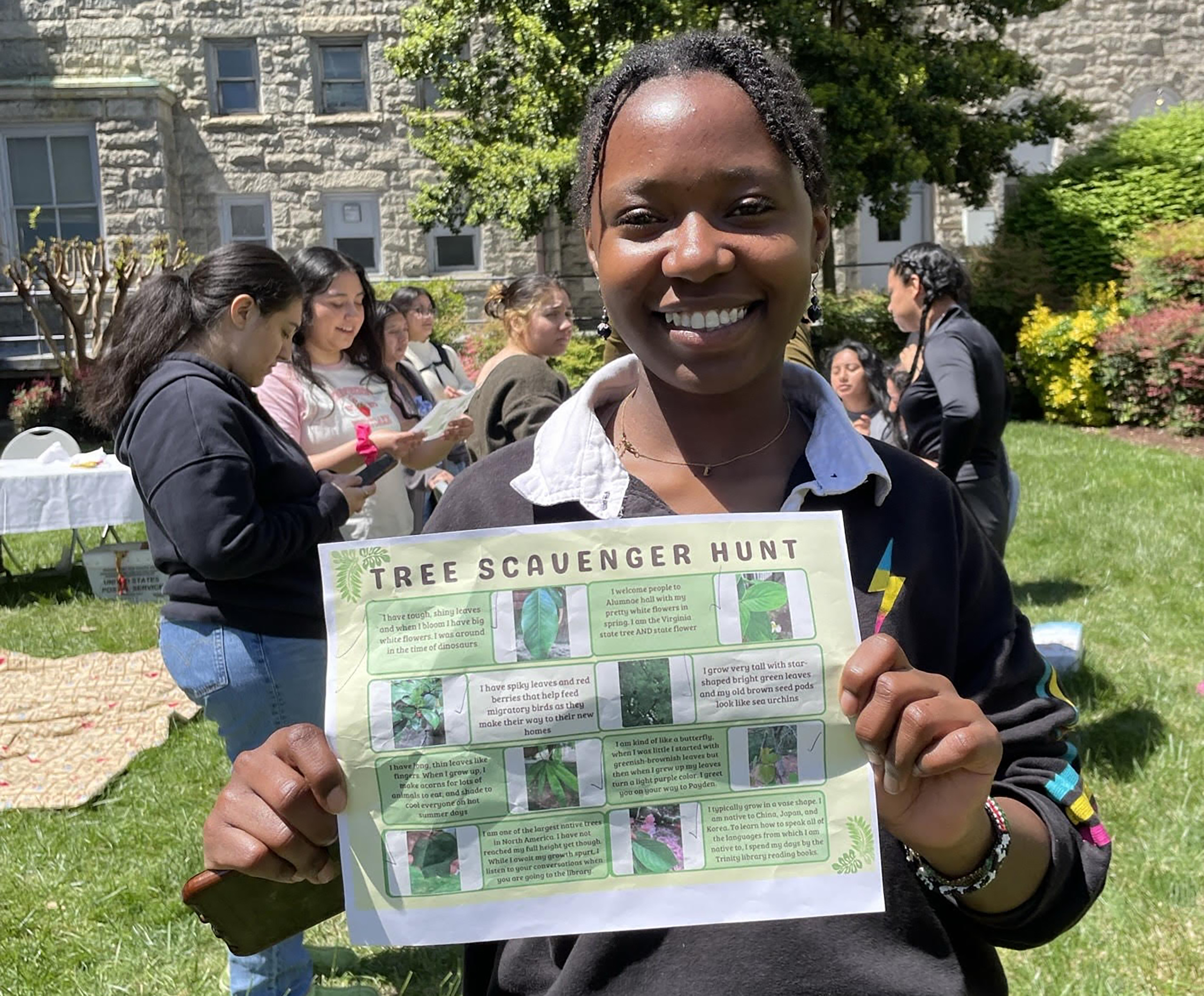
By Emily Gonzalez and Tiffany Zheng
Trinity Times Correspondents
When Trinity Washington University students Claudia Rosa-Rivera and Cecilia Rivas first began to understand the gravity of the climate crisis, they found themselves feeling helpless and depressed about the environmental health of the planet.
However, once they became leaders of Trinity’s Sustainability Initiatives Club, Rosa-Rivera and Rivas discovered that environmental advocacy gave them the kind of purpose that improved their mental health.
As they prepare for Earth Day 2025 on April 22, they reflected on their shared journey into environmental leadership.
“Hey, we are looking for a new president,” was the message being sent by Sustainability Initiatives Club members in the beginning of the 2023 spring semester, an idea that both Rosa-Rivera and Rivas took seriously.
After participating in more events and classes where they learned about climate change and environmental science, they felt like they had found their mission.
“I was able to find my purpose and discover my love for environmental science,” Rosa-Rivera said.
Prior to this realization, they weren’t sure what they envisioned for their futures. Feeling so much happiness from engaging in climate advocacy solidified their decision to continue advocating for climate action in their careers.
Wanting others to experience the same joy they had felt, Rosa-Rivera gladly took on the role of president of the Sustainability Initiatives Club in her junior year in the fall of 2023, and Rivas became vice president.
“Even if not many people come to our meetings, a lot of people come to our events, and I can see their excitement,” Rosa-Rivera said. “They’re connecting with nature and learning while doing so.”
At Trinity, faculty members – such as Chemistry Professor Shizuka (Zukes) Hsieh and Environmental Studies Professor Patrice Nielson – focus on improving both the state of the earth and their students’ mental health, seeing an improvement in students’ well-being as they advocate for climate change.
Participating in activities like those the Sustainability Initiative Club hosts can “heal” an individual through absorbing nature, Hsieh said.
In the past year, the Sustainability Initiatives Club has hosted events such as “a recycled planter’s event where people brought in recycled bottles, and we gave them some plants,” Rosa-Rivera told Trinity Times. “We also sponsored a trip to the Botanical Garden and held an Earth Day picnic with a tree scavenger hunt.”
As students begin advocating for climate change, they may develop climate anxiety, Rivas said, but added that advocacy has also pushed students to identify their self-purpose and values.
“I’ve seen big changes in students as they learn more and get involved in their communities,” Nielson said, noting that they found a profound joy in their advocacy.
Several students told Trinity Times they continued participating in climate change advocacy after taking one of Nielson’s classes.
“Trinity is a small university,” Nielson said, “but I know the students I’ve taught have made a difference.”
One of those students is Jamileth Mendez, who co-founded the Sustainability Initiatives Club and spent a year in the Chesapeake Conservation and Climate Corps following her 2023 Trinity graduation. Mendez was assigned as the environmental program manager for the Town of Edmonston, Maryland. In that role, she created a youth green team, organizing young people in the town for community cleanups, tree planting, and other events that trained them to become environmental leaders.
Often, students find themselves stressed, powerless, and depressed about the country’s slow progress in addressing environmental concerns as the semester progresses. But they need to be reminded that it takes the efforts of people like them to foster movement, Nielson said.
Trinity professors often remind students that their climate change advocacy work can help them work through personal anxieties and stressors, especially if they focus on the United Nations’ 17 goals in sustainable development. These goals include eradicating poverty, eliminating hunger, creating good health and well-being, providing quality education, ensuring clean water and sanitation, developing affordable and clean energy, and taking climate action.
The Society for Research in Child Development (SRCD) confirms that people who involve themselves in advocacy enhance their mental health and well-being. In essence, advocacy has proven to be more than just a tool for societal change; it is a pathway to personal growth and mental health improvement, according to a 2023 report by the SRCD.
Environmental activities often take place outdoors, and Nielson said that can also improve someone’s mental health outlook.
“I always feel better after being outdoors,” she said. “I love trees and plants. I feel less anxiety and less depressed when I go outdoors.”

This meaningful engagement not only helps distract from personal worries but also fosters a strong sense of community and connection with others who share similar passions.
Rosa-Rivera and Rivas also stressed how engaging in outdoor activities not only brings them happiness, but also a sense of purpose in the environment.
“Climate change worries us,” Rosa-Rivera said. “But it feels good knowing that we are spreading awareness and engaging in this work.”
Rivas said that even small actions are important, including “conserving water or taking public transportation. It can mean a lot.”
There are many ways to bring sustainability off-campus too, Nielson said. “I try to eat more efficiently sourced protein and incorporate more sustainable practices into my daily routine. Even eating leftovers is a great way to reduce our food waste.”
It has become a mission for Rosa-Rivera to enlist her fellow Trinity students in some kind of environmental sustainability efforts, but she doesn’t like adding more stress to their already stressful college lives.”
Seeing and experiencing the effects of climate change definitely make me feel anxious,” she said. “But it’s reassuring that a lot of people share the same worries as me and are actively taking action against those worries.”